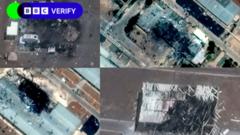The International Atomic Energy Agency (IAEA) reports that there has been no additional damage to Iran's nuclear facilities since recent Israeli airstrikes, affirming monitoring and assessment of the situation.
No Further Damage Reported at Iranian Nuclear Facilities After Recent Strikes

No Further Damage Reported at Iranian Nuclear Facilities After Recent Strikes
Global nuclear watchdog confirms status of Iran's nuclear sites post-Israeli airstrikes.
The head of the International Atomic Energy Agency (IAEA), Rafael Grossi, has informed member states that there has been no additional damage to Iran's nuclear sites following the Israeli airstrikes that occurred on Friday. During a meeting in Vienna, Grossi reported that the above-ground enrichment facility at Natanz was destroyed, but there were no discovered signs of damage to the underground facility. The Israeli military claimed the strikes aimed to halt Iran's nuclear weapons development, alleging that nine nuclear scientists were killed in the process.
According to Grossi, the Israeli attacks resulted in the damage of four buildings at the Isfahan Nuclear Technology Centre, including a uranium conversion plant, yet no harm was observed at the underground Fordo enrichment facility. In response to the situation, Iran has consistently asserted that its nuclear program is for peaceful purposes, urging the IAEA's 35-nation board to condemn the Israeli strikes.
In his briefing to the board, Grossi emphasized the IAEA's careful monitoring of Iran's nuclear facilities, assessing radiation levels in collaboration with local authorities. He highlighted that the attack on Natanz primarily affected the Pilot Fuel Enrichment Plant (PFEP), where uranium enrichment efforts were close to weapons-grade purity. Furthermore, the strikes led to the destruction of essential electricity infrastructure at Natanz, raising concerns over potential damage to the facility's centrifuges.
The nuclear watchdog also noted that radiological and chemical contamination had been detected at the Natanz site, but off-site radiation levels remained stable. While the Israeli military asserted that damage occurred to the underground centrifuge hall, no evidence was provided to substantiate such claims.
Grossi conveyed that no damage had been reported at Fordo or the Khondab heavy water reactor, which is under construction, urging for maximum restraint from all parties involved. He warned that escalatory military actions pose significant risks, potentially leading to serious radiological releases affecting both people and the environment.
In Tehran, Iranian officials condemned the Israeli attacks as blatant violations of international law, with Foreign Minister Abbas Araghchi expressing hopes that the IAEA would address these aggressions appropriately. Amidst the ongoing tensions, the latest reports indicate that Israeli strikes have resulted in over 220 fatalities, while Iranian missile attacks have claimed 24 Israeli lives since the conflict escalated.
Last week, the IAEA's board took the significant step of declaring Iran in breach of its non-proliferation obligations for the first time in two decades, citing Iran's lack of transparency regarding its nuclear activities. Iran, which has progressively breached the restrictions set by the 2015 nuclear deal, possesses enough enriched uranium to potentially construct multiple nuclear weapons according to the agency's findings.























